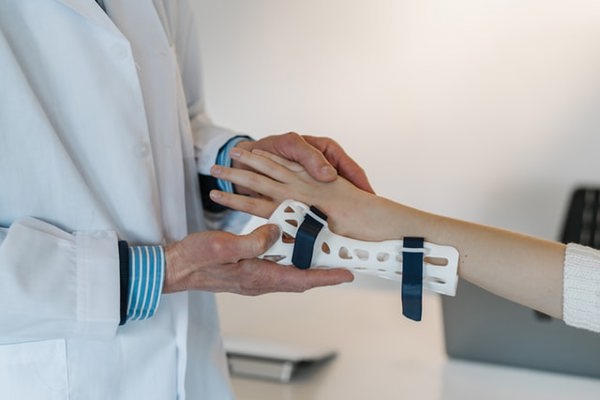We have provided some practical tips in this article on what you should do if you are involved in a road traffic crash abroad.
1. Seek medical attention
Ensuring your health and safety is the number one priority. You must seek medical attention for any injuries that you or your passenger have sustained in the crash.
It is also important that you seek emotional and practical support, particularly when the crash has resulted in serious injuries or the fatality of a loved one. Morton Fraser is proud to partner with Brake the road safety charity. Brake campaign for safer roads and provide support for those who are bereaved or seriously injured following a road traffic crash. Although they are a UK based charity, Brake's National Road Victim Service collaborates with the Foreign, Commonwealth and Development Office (FCDO) to help provide support to those bereaved by a road traffic crash that happened abroad. More information on Brake, the FCDO and the support these organisations can provide can be found in this useful article.
2. Report the collision
It is important for any subsequent claim that you report the crash to the local authorities in the country where it occurred. The rules surrounding reporting a crash may vary depending on the country that you are in, therefore, it is important to do this is soon as possible. Request a copy of the police report, including the accident report number and any other documentation produced in relation to your report of the crash. If required, ask for an interpreter to assist with this. It would also be worth requesting contact details of the police station you made the report to so that, if required, you can contact them on your return to Scotland.
3. Collect information
Collate as much information as possible about the crash, including the other driver's contact details, their vehicle registration information and insurance details. If there are any witnesses be sure to take a note of their contact details too. Take photos of the collision area and the vehicle if it is safe to do so. You should also ask any witnesses whether they have dashcam footage that you could get a copy of. All of this information alongside the police evidence will help to prove who was at fault in causing the crash.
4. Inform your insurance company or car rental company
You should make your insurance company aware of the crash as soon as possible if you are driving your own vehicle abroad. Do not wait until you have come home to do this as there may be certain conditions to your insurance when driving abroad such as deadlines for reporting a road traffic crash. This is also important to ensure you have cover for any medical expenses as well as future legal action, if required. Share all the information you have collated with your insurers.
If you are in a collision whilst driving a hired vehicle, you must contact the car rental company as soon as possible after contacting the police. This will be much easier to do whilst you are still in the country where you hired the vehicle. Again, it is important to share all information that you have with them.
5. Seek legal advice
It is important that you seek legal advice from a solicitor at the earliest stage possible. The cross-border element makes these types of claims complex and so it is important that you obtain legal advice on the legal processes involved and your rights. Morton Fraser is experienced in providing advice to individuals who have been involved in road traffic collisions abroad, and we will be able to provide you with advice on the prospects of successfully making a claim.
The process for making a claim will depend on the type of holiday you were on. For instance, if your crash took place whilst you were on a package holiday, you may be entitled to raise a court action in Scotland as opposed to raising a court action in the country where the crash occurred. There are strict requirements which need to be met for your holiday to be classed a 'package holiday' in terms of the law and your solicitor will be able to advise you on whether this applies to your case. In circumstances where you were not travelling abroad as part of a package holiday, you may still be entitled to make a claim.
6. Contact the other driver's insurance company
Your lawyer will contact the other driver's insurance company to initiate the claim process and establish the other driver's position on liability. Whilst in some circumstances liability will be admitted, it may be that liability is disputed. In either scenario, your lawyer will advise you on the next steps of the claim process, including further investigations and raising legal proceedings, if it is necessary to do so.
7. Compensation limits
There may be limits to the amount of compensation you can recover. The amount of compensation you will be entitled to will depend on the law of the country where the crash happened. Whilst your lawyer will be able to provide you with advice on what the value of your claim is likely to be, this is not an exact science and there are many components to be considered when valuing a claim. Our Compensation Calculator provides further guidance on levels of compensation which may be awarded by the Scottish courts for different types of injuries.
8. Legal proceedings
In particularly complex situations or where it has not been possible to resolve your case, it may be necessary to raise legal proceedings in a court local to where your collision occurred. In these circumstances, Morton Fraser will be in a position to refer you to a suitably qualified lawyer who will be able to assist you, as we are members of Interlaw, a worldwide network of expert law firms that work together and can refer work seamlessly between one another. We are the only Scottish member of the Interlaw network.
9. Time limit
In Scotland, you have three years from the date of the crash to raise a court action, however, the laws in each country determine the time limit which applies. For example, whilst Spain has a typical period of one year to raise a personal injury claim, in France the period is typically ten years, albeit in both countries the timescale which applies depends on the circumstances of the claim. It is important to note that the time limit varies between countries and you should take advice to ensure any time limits are complied with in good time.
The process for raising a claim abroad can be extremely complex and the cross-border legal considerations will vary depending on the country where the collision occurred. Morton Fraser is experienced in pursuing claims following collisions abroad and have acted for a number of individuals in these situations. We can provide advice on how to proceed with your claim to ensure you protect your right to make a claim and achieve the best possible outcome.
If you would like advice in relation to your potential claim, please don't hesitate to contact our experienced and friendly Personal Injury team for a free, confidential initial discussion.


